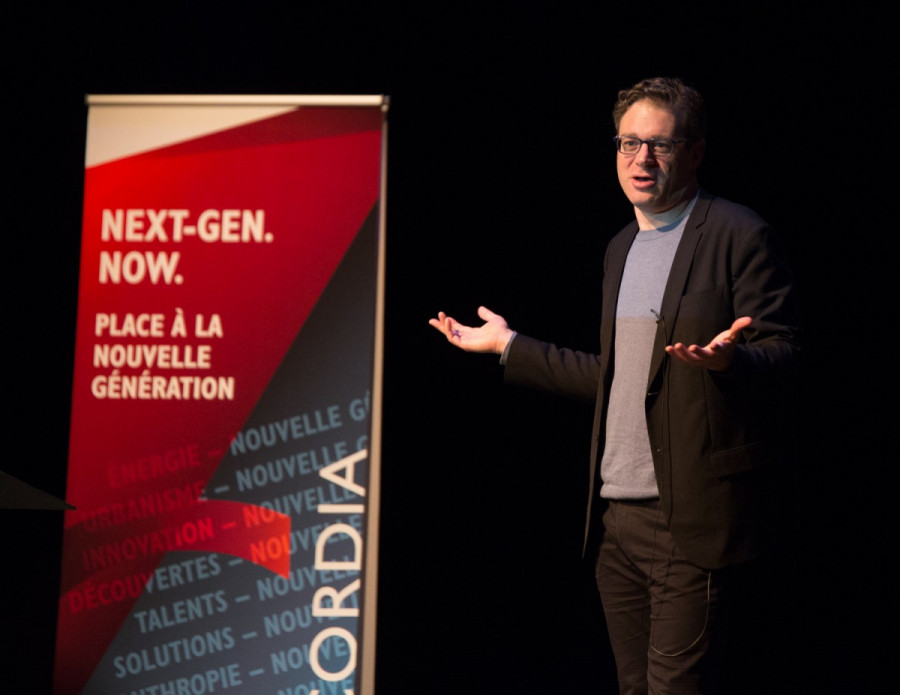Jonah Keri Shares His Experiences in Journalism at Concordia Talk
Concordia Graduate on Student Journalism and the Importance of Storytelling
Before I was even born, Jonah Keri, had graduated from Concordia’s journalism program.
In 1997, he left the school with a degree in journalism, hoping to become a sports journalist. Instead, he found himself doing stock market reporting.
“It took a long time for me to actually get to sports journalism,” said Keri. “I only got my first sports journalism job when I was 37 years old.”
For context, Keri is 43. He’s only been a full-time sportswriter for six years. In the interim, he wrote stock market pieces, mainly out of necessity.
“I had no training in that field,” he said. “I moved to Los Angeles, and I applied to six different newspapers, and pitched the idea of being a sports business writer.”
The papers didn’t think there was a market for this type of writing, and so Keri was forced into writing business pieces.
“These papers were willing to hire me, but not for what I wanted to do,” said Keri. “So it just became ‘well okay, all six of these papers are the same,’ and it was a matter of who was willing to pay me more, which ended up being this stock market paper.”
Keri enjoyed writing for this publication and stayed for over a decade.
“My politics were super different from everybody else,” he said. “With stock market stuff, it tends to be pretty far to the right and I was not that, because I’m Canadian, but other than that it was a really good place to learn.”
The numerical information and critical thinking required to write those kinds of stories armed him for the statistical world of sports journalism, and so he went in prepared.
While the Landscape of the Media is Changing, Storytelling Isn’t
Being a journalist today in Canada can be extremely difficult, according to Keri.
“It’s tough,” said Keri. “I have friends in Canadian media, especially sports media who have struggled a lot.”
The media is changing rapidly, with a large chunk of content being published online as opposed to the traditional print publication.
In the end though, it’s important to keep in mind the roots of journalism.
“It’s just stories,” he said. “Whether you’re telling them on Facebook Live, Periscope, or whatever, it’s all good.”
Social media is important to the field of journalism and the platforms that are useful to journalists are abundant. It allows individuals to capture events and tell stories about them, which speaks to the storytelling aspects of journalism.
“If this is your passion, just figure out what you wanna do,” said Keri, of the tough market that is journalism. “You make it work.”
Student Journalism is Important
Keri himself was a journalism student during his time at Concordia, serving as co-sports-editor at The Concordian newspaper.
“I worked with a guy named Derek Marinos, and he means the world to me and was absolutely a big influence on me,” said Keri.
He didn’t only work on sports though, he also wrote an article for the arts sections, citing an album review he did of Shaquille O’Neill’s second studio album, ShaqFu: Da Return, a neat tie-in of both sports and arts.
Keri believes that his participation in student journalism was beneficial to him as a writer, leaving him with experience that would help him later on as a journalist.
“I’m a hands on guy, so to learn under pressure and [have] two A.M deadlines, was great,” said Keri.
Additionally, Keri vouches for internships in order to gain practical experience. He interned for The Montreal Gazette and The Ottawa Citizen, among other publications, while finishing his journalism degree at Concordia.
A word of advice to student journalists from Keri is to make sure you love what you’re doing, and if you know that you love what you’re doing, you’ll find a way to make that work.
“Maybe you love what you’re doing, and you give it a shot,” he said. “Maybe you need to pay your bills and have a boyfriend or girlfriend and you decide ‘I can’t handle this right now,’ and then you come back to it. Just do the thing that you love, assuming you can do so financially, and if that’s journalism, then that’s great.”



_600_375_90_s_c1.jpg)
4_600_375_90_s_c1.jpg)
1_600_375_90_s_c1.jpg)
_600_375_90_s_c1.jpg)